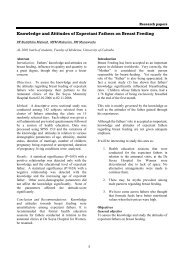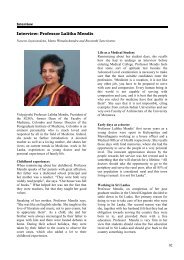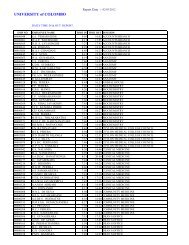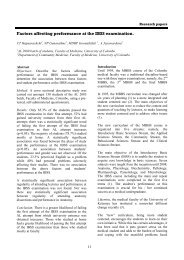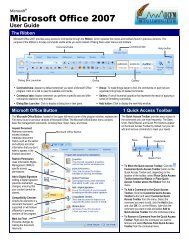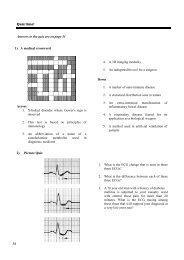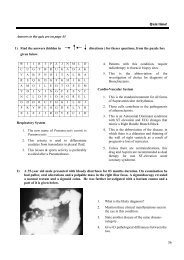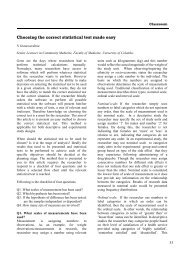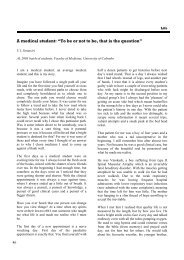Prevalence of depression among institutionalized elders in the ...
Prevalence of depression among institutionalized elders in the ...
Prevalence of depression among institutionalized elders in the ...
You also want an ePaper? Increase the reach of your titles
YUMPU automatically turns print PDFs into web optimized ePapers that Google loves.
Discussion<br />
S<strong>in</strong>ce research on geriatric psychiatry <strong>in</strong> Sri Lanka<br />
is sparse, <strong>the</strong> Sri Lankan figures <strong>of</strong> prevalence <strong>of</strong><br />
<strong>depression</strong> <strong>among</strong> <strong>the</strong> elderly could not be<br />
obta<strong>in</strong>ed. Accord<strong>in</strong>g to global figures <strong>the</strong><br />
prevalence <strong>of</strong> <strong>depression</strong> <strong>among</strong> elderly was 10-<br />
15% (5). In <strong>the</strong> present sample, severity was<br />
assessed us<strong>in</strong>g <strong>the</strong> GDS. The mean score was<br />
6.06/15 and <strong>the</strong> mode was 9/15. A majority<br />
(76.78%) were hav<strong>in</strong>g mild <strong>depression</strong>.<br />
A study done <strong>in</strong> Turkey to estimate <strong>the</strong> prevalence<br />
<strong>of</strong> <strong>depression</strong> <strong>among</strong> <strong><strong>in</strong>stitutionalized</strong> elderly,<br />
found that 58.3% <strong>of</strong> <strong>the</strong> total study population was<br />
hav<strong>in</strong>g depressive symptoms (45.1% <strong>in</strong> males and<br />
54.9% <strong>in</strong> females) (8). Literature states that<br />
women are twice as likely to suffer from<br />
<strong>depression</strong> as men as <strong>the</strong> result <strong>of</strong> hormonal<br />
changes result<strong>in</strong>g from menstruation, pregnancy<br />
and menopause (9). The above statistics closely<br />
match <strong>the</strong> results <strong>of</strong> our study <strong>in</strong> which <strong>the</strong><br />
prevalence <strong>of</strong> <strong>depression</strong> was 56% (n=100) <strong>in</strong> <strong>the</strong><br />
total sample with a female preponderance (46.4%<br />
<strong>in</strong> males vs. 53.6% <strong>in</strong> females). However, <strong>the</strong><br />
female preponderance was not statistically<br />
significant (p > 0.05).<br />
More than a half <strong>of</strong> our sample was aged between<br />
60 to 69 years (mean age 69.9 years). Depression<br />
was more prevalent <strong>among</strong> elderly aged 60-69<br />
years. However, <strong>the</strong> <strong>in</strong>dividuals’ age was not seen<br />
to be significantly associated with <strong>depression</strong>.<br />
Depression is caused by a chemical imbalance <strong>in</strong><br />
<strong>the</strong> bra<strong>in</strong>. The exact mechanism is unknown, but<br />
bouts <strong>of</strong> <strong>depression</strong> can be triggered by sad or<br />
stressful life events, hormonal changes, disease, or<br />
certa<strong>in</strong> medications. People with low self-esteem<br />
and a pessimistic outlook on life, seem to be<br />
particularly prone to <strong>depression</strong> (9). S<strong>in</strong>ce marital<br />
status, leisure activities, psychological and<br />
f<strong>in</strong>ancial support, can be considered as factors<br />
which may contribute towards mental well-be<strong>in</strong>g,<br />
<strong>the</strong> study was carried out with an objective to f<strong>in</strong>d<br />
any association <strong>of</strong> <strong>the</strong>se factors with <strong>depression</strong>.<br />
Majority (73.21%) had chronic diseases, <strong>the</strong><br />
presence <strong>of</strong> which was significantly associated<br />
with <strong>depression</strong>. Absence <strong>of</strong> psychological support<br />
was significantly associated with <strong>depression</strong>.<br />
The most common two reasons for admission to<br />
“Homes for <strong>the</strong> Elderly” were absence <strong>of</strong> a<br />
caregiver and family conflicts (with children, <strong>in</strong>laws,<br />
grand children etc. Of <strong>the</strong> above two<br />
reasons, family conflicts had a statistically<br />
significant association with <strong>the</strong> occurrence <strong>of</strong><br />
<strong>depression</strong>. Depression was not significantly<br />
associated with marital status, f<strong>in</strong>ancial support or<br />
employment status with <strong>depression</strong>.<br />
The elderly <strong>in</strong> our sample has had a reasonably<br />
good level <strong>of</strong> school<strong>in</strong>g, with a literacy rate <strong>of</strong><br />
56%. Though some studies have shown that low<br />
literacy level is a risk factor for <strong>depression</strong> <strong>in</strong> <strong>the</strong><br />
elderly, <strong>the</strong>re was no statistically significant<br />
association between <strong>the</strong> existence <strong>of</strong> <strong>depression</strong><br />
and literacy level <strong>in</strong> our study sample.<br />
Conclusion<br />
In our study <strong>the</strong> prevalence <strong>of</strong> <strong>depression</strong> was 56%<br />
with a female preponderance (53.6%). Absence <strong>of</strong><br />
psychological support, presence <strong>of</strong> chronic<br />
diseases and family conflicts had a statistically<br />
significant association with <strong>the</strong> occurrence <strong>of</strong><br />
<strong>depression</strong> <strong>in</strong> <strong>the</strong> study sample. Depression<br />
<strong>among</strong> <strong><strong>in</strong>stitutionalized</strong> elderly is an important<br />
timely issue <strong>of</strong>ten undiagnosed and untreated,<br />
which needs to be addressed. In <strong>the</strong> light <strong>of</strong> <strong>the</strong><br />
results <strong>of</strong> this paper, a multidiscipl<strong>in</strong>ary approach<br />
is required for prepar<strong>in</strong>g social arrangements<br />
enhanc<strong>in</strong>g family and community support and<br />
home care for elderly <strong>in</strong>dividuals.<br />
References<br />
1. Siddhisena KAP. Mortality trends, determ<strong>in</strong>ants and<br />
implications <strong>in</strong> Sri Lanka: Retrospect and prospect. In:<br />
Demography <strong>of</strong> Sri Lanka: Issues and challenges.<br />
Department <strong>of</strong> Demography, University <strong>of</strong> Colombo, Sri<br />
Lanka. 2000. p. 119-31.<br />
2. Department <strong>of</strong> Health Services, Sri Lanka. Annual<br />
Health Bullet<strong>in</strong>. Colombo, 2002.<br />
3. M<strong>in</strong>istry <strong>of</strong> Health. Population Division. Emerg<strong>in</strong>g<br />
population issues <strong>in</strong> Sri Lanka, M<strong>in</strong>istry <strong>of</strong> Health,<br />
Colombo, 1993.<br />
4. David CS. <strong>Prevalence</strong> <strong>of</strong> Depression and its Treatment <strong>in</strong><br />
an Elderly Population. Archives <strong>of</strong> General Psychiatry<br />
2000;57:601-7.<br />
5. Gelder M, Mayou R, Geddes J. Oxford Core Text <strong>of</strong><br />
Psychiatry. 2 nd ed. Oxford:Oxford University Press; 1999.<br />
6. Department <strong>of</strong> Social Services and National Secretariat<br />
for Elders, Sri Lanka. National Survey on Elders, 2003-<br />
2004. Colombo, 2005.<br />
7. Taylor MEH. Measur<strong>in</strong>g Depression <strong>in</strong> Elderly, What<br />
Scale is best. Journal <strong>of</strong> Gerontology 1998;53:12-8.<br />
8. M<strong>in</strong>e E. The prevalence <strong>of</strong> <strong>depression</strong> <strong>in</strong> elderly liv<strong>in</strong>g at<br />
homes <strong>in</strong> Eastern Turkey. International Journal <strong>of</strong><br />
Human Sciences;12:45-56.<br />
9. Mc Donald YG, Frankl<strong>in</strong> ERD. Psychiatric illnesses <strong>in</strong><br />
Elderly. Journal <strong>of</strong> Gerontology.1992;47:142-150.<br />
31



